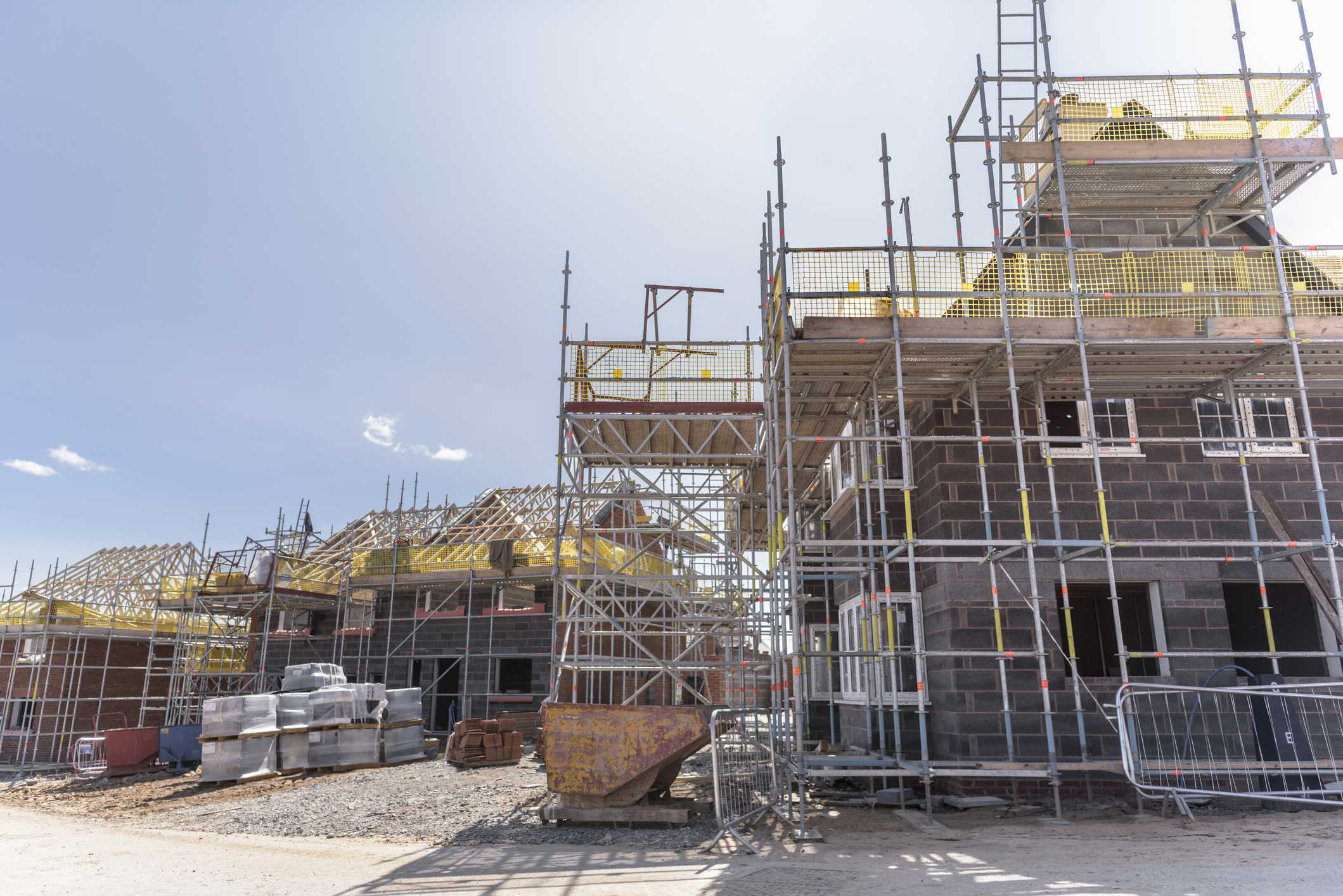Housing slowdown ‘deeper than anticipated’ as property sales slump
New data from HMRC shows a fall in property sales - now experts predict a delay to the housing recovery


Get the latest financial news, insights and expert analysis from our award-winning MoneyWeek team, to help you understand what really matters when it comes to your finances.
You are now subscribed
Your newsletter sign-up was successful
Want to add more newsletters?

Twice daily
MoneyWeek
Get the latest financial news, insights and expert analysis from our award-winning MoneyWeek team, to help you understand what really matters when it comes to your finances.

Four times a week
Look After My Bills
Sign up to our free money-saving newsletter, filled with the latest news and expert advice to help you find the best tips and deals for managing your bills. Start saving today!
The number of property transactions has fallen after a bumper month in March leading experts to say the housing market slowdown will likely be longer and deeper than anticipated.
Residential property sales slumped 8% from the previous month, while sales in April fell by 25% compared with April 2022, with around 82,120 transactions taking place across the UK, according to new data from HM Revenue and Customs (HMRC).
HMRC noted the fall "appears particularly large".
MoneyWeek
Subscribe to MoneyWeek today and get your first six magazine issues absolutely FREE

Sign up to Money Morning
Don't miss the latest investment and personal finances news, market analysis, plus money-saving tips with our free twice-daily newsletter
Don't miss the latest investment and personal finances news, market analysis, plus money-saving tips with our free twice-daily newsletter
The data shows a return to the downward trend seen earlier in the year, reflecting the long-lasting effects of the mini-Budget on the UK property market.
Seasonally adjusted estimates of the number of UK residential transactions in April 2023 show there has been a huge 25% fall compared to the same month last year.
But HMRC noted the impact of March’s elevated figures. It says: "The number of transactions in March was high due to a combination of factors including a larger number of working days relative to April and the final month for purchases to be completed under the government's Help To Buy equity loan scheme."
Karen Noye, mortgage expert at Quilter, says April’s figures show a “return to the buoyant market we had grown accustomed to is not yet on the cards,” despite some optimism and promising data from elsewhere in the economy.
The spring and summer months tend to be a busy period for the housing market but high mortgage rates could undermine activity and “put a dampener on transactions as moving home or taking the first step onto the property ladder becomes increasingly unaffordable,” adds Noye.
Mike Scott, chief analyst at estate agency Yopa, says: "This disappointing number, combined with the recent equally disappointing inflation figures and the resulting increases in market expectations for interest rates, means that the housing market slowdown is likely to be longer and deeper than we originally anticipated."
Mortgage approvals drop in April
Net mortgage approvals for house purchases also fell over the past month, from 51,500 in March to 48,700 in April, separate data from the Bank of England reveals, but approvals for remortgaging increased slightly from 32,200 to 32,500 during the same period.
Meanwhile, net borrowing of mortgage debt continued to decline in April, falling to a record low of £1.4 billion - the lowest level on record when excluding anomalous data from the onset of the Covid-19 pandemic.
Alice Haine, personal finance analyst at BestInvest says it is a “reflection of the hit to consumer appetite for property amid sticky inflation and rising borrowing costs.”
She says: “The outlook from here is far from rosy, with mortgage rates edging up over the past week as lenders pull hundreds of products to reassess borrowing conditions.
“Changing interest rate expectations – with rates now tipped to peak at 5.5.% or higher in the coming months - has caused more mortgage turmoil for borrowers who were hoping for some respite from the turbulence seen over the past few months,” she adds.
What does this mean for mortgage rates and house prices?
House prices in the year to May dropped by 3.4% - the largest decline since July 2009 - the latest data from Nationwide’s house price index shows, and the trend is likely to continue owing to lower levels of buy-side demand.
Quilter’s Noye says prices will continue “falling steadily for a few months yet as sellers compete for buyers.”
She continues: “For those still keen to move or buy their first home, where possible it may be worth considering a fixed-term deal for two years to make the most of lower predicted rates in 2025.
“If you are considering opting for a tracker mortgage to see you out of the current period of inflated rates, it is important to consider the potential for further BoE rate rises and the impact this would have on your monthly outgoings,” she adds.
But Alex Lyle, director of estate agency Antony Roberts, says some types of properties are selling better than others.
“The majority of the most desirable houses – £1.5 million-plus family homes – are going under offer within three weeks of marketing. However, flats, in particular those compromised in some way, are struggling to achieve the prices we could have expected this time last year.”
Compounding the issue are delays in processing deals.“It is hard to remember a time when deals took so long to progress from agreed to an exchange of contracts. As well as chains being more protracted, many solicitors are finding themselves working at capacity,” Lyle says.
Meanwhile, mortgage providers have pulled a number of products from sale as concerns mount over whether the Bank of England will continue to raise interest rates, possibly as high as 5.5%.
Buy-to-let mortgages have been particularly impacted, with 14% removed from the market.
Get the latest financial news, insights and expert analysis from our award-winning MoneyWeek team, to help you understand what really matters when it comes to your finances.
Tom is a journalist and writer with an interest in sustainability, economic policy and pensions, looking into how personal finances can be used to make a positive impact.
He graduated from Goldsmiths, University of London, with a BA in journalism before moving to a financial content agency.
His work has appeared in titles Investment Week and Money Marketing, as well as social media copy for Reuters and Bloomberg in addition to corporate content for financial giants including Mercer, State Street Global Advisors and the PLSA. He has also written for the Financial Times Group.
When not working out of the Future’s Cardiff office, Tom can be found exploring the hills and coasts of South Wales but is sometimes east of the border supporting Bristol Rovers.
-
 How a ‘great view’ from your home can boost its value by 35%
How a ‘great view’ from your home can boost its value by 35%A house that comes with a picturesque backdrop could add tens of thousands of pounds to its asking price – but how does each region compare?
-
 What is a care fees annuity and how much does it cost?
What is a care fees annuity and how much does it cost?How we will be cared for in our later years – and how much we are willing to pay for it – are conversations best had as early as possible. One option to cover the cost is a care fees annuity. We look at the pros and cons.
-
 Homebuilders report slumping profits as housing market stutters
Homebuilders report slumping profits as housing market stuttersPersimmon has become the latest UK homebuilder to warn on profits and completions as higher mortgage rates cool down the property market.
-
 Persimmon yields 13.8%, but can you trust it to deliver?
Persimmon yields 13.8%, but can you trust it to deliver?Tips With a dividend yield of 13.8%, Persimmon looks like a highly attractive prospect for income investors. But that sort of yield can also indicate a company in distress. Rupert Hargreaves looks at the numbers to find out if it's sustainable.
-
 Good news: UK house prices are stuck in the doldrums
Good news: UK house prices are stuck in the doldrumsFeatures UK house prices are set to tread water while incomes rise, making property more affordable, says Merryn Somerset Webb.
-
 Bittersweet profits for buy-to-let landlords
Bittersweet profits for buy-to-let landlordsFeatures The government’s determination to make the buy-to-let sector less appealing to investors seems to have worked, with landlords suffering a dismal few years.
-
 Some rare good news for landlords
Some rare good news for landlordsFeatures Two property-related changes you might have missed in last week's Budget, along with a rare good-news story for landlords.
-
 Help-to-buy’s mortgage prisoners
Help-to-buy’s mortgage prisonersFeatures First-time buyers who purchased their homes using the government’s help-to-buy scheme could find themselves short of options when they decide to remortgage.
-
 First-time buyers: don’t touch property crowdfunding products with a bargepole
First-time buyers: don’t touch property crowdfunding products with a bargepoleFeatures Property crowdfunding products aimed at first time buyers don’t help anyone, says Merryn Somerset Webb. They just add an extra slice of personal financial risk.
